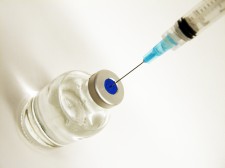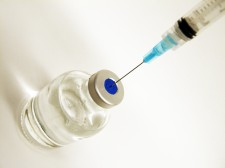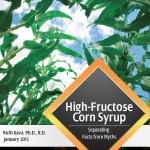We ve previously reported on studies indicating that circumcision results in reduced rates of HIV transmission in Africa, but now a new study finds that the procedure may also lower the risk of contracting genital herpes (HSV-2) as well. Presented at the Conference on Retroviruses and Opportunistic Infections, the latest study collected data on men in Orange Farm, South Africa, both before and after a pro-circumcision public health initiative gained popularity in the city.
Search results
It once was thought that, when we d finally figured out the human genome, we d have all of the answers to the genetic underpinnings of various diseases. A person who had his genome mapped would know all there was about his risk of disease. But now that the human genome has indeed been fully mapped, scientists are starting to realize that the process of understanding the genetic basis of disease is nowhere as simple.
It seems that the widely prescribed antibiotic azithromycin (sold as Zithromax in Z-Paks) may slightly increase the risk of sudden cardiac death when compared to no antibiotic treatment, according to a study just published in the New England Journal of Medicine.
 A late-stage study of Pfizer s Prevnar 13 pneumonia vaccine has met the main trial goal, the company announced.
A late-stage study of Pfizer s Prevnar 13 pneumonia vaccine has met the main trial goal, the company announced.
Providing women with free, long-acting contraception appears to be a good way to cut the U.S. rates of abortion and unintended teen pregnancy, a new study suggests. The nearly 10,000 women at risk for unintended pregnancy in the St.
The Competitive Enterprise Institute (CEI) will hold a panel discussion in D.C. titled Chemical Policy and Regulation: The Costs of Bad Science and Over-Caution:
According to a July 2012 Gallup Poll, five percent of Americans report being vegetarians. Well, for those five percent, a new study published in JAMA Internal Medicine suggests that vegetarians may live longer than their carnivorous counterparts, although results were somewhat inconclusive. The study looked at the eating patterns of about 70,000 Seventh-day Adventists from [...]
The post To be a vegetarian or not to be a vegetarian appeared first on Health & Science Dispatch.
Anti-wrinkle creams step aside: a new study suggests applying sunscreen daily may work better to keep your skin looking young. Though it’s been widely suggested that sunscreen could delay skin aging, little evidence has been shown until now. In this first large study on sunscreen and skin aging published in the Annals of Internal Medicine, [...]
The post Daily sunscreen may reduce signs of aging appeared first on Health & Science Dispatch.
It’s a given that the high blood sugar levels (hyperglycemia) in diabetes can lead to severe consequences down the road — neuropathy, kidney failure, blindness, and heart disease, for example — but it’s also the case that treating hyperglycemia can be problematic. If treating high blood sugar is too aggressive, it can cause severe [...]
The post Blood sugar: How low should we go? appeared first on Health & Science Dispatch.
This morning’s unanimous Supreme Court decision — which overturned a lower Federal court decision allowing Myriad Genetics’ patent of two human genes — is a groundbreaking moment in the history of biotechnology, and a case that will surely rank among the most noteworthy biomedical decisions of our time. The genes in question are called BRCA-1 [...]
The post The Supreme Court nails it (and Myriad)—No, you cannot patent a gene appeared first on Health & Science Dispatch.
In an extensive re-analysis of data from three large observational trials, Dr. An Pan and colleagues from the National University of Singapore and the Harvard School of Public Health, reported that increased intake of red meat (beef, lamb, or pork) over time increased the risk of type 2 diabetes, while decreasing intake slightly decreased the [...]
The post Will reducing red meat intake decrease diabetes risk? Not so much appeared first on Health & Science Dispatch.
A new study links caffeine consumption by pregnant women with reduced birth weight in their offspring. For each 100 milligrams of caffeine consumed daily, as recorded in daily food diaries, the newborn on average had a birth weight between three quarters to an ounce lower than women who ingested no caffeine. (A 16 oz. cup of Starbucks Pike Place Roast has 330 mgs of caffeine, according to Starbucks website).
A little over a month ago, we reported a swine flu vaccine scare suggesting a link with narcolepsy in children. The scare cited 795 reported narcolepsy cases in 30 million vaccine recipients, to which ACSH s Dr. Gilbert Ross said Incidence of narcolepsy in the general population is estimated to be between 200-500 cases per million. Meaning that the incidence of narcolepsy in vaccine recipients appears to be less than the general population.
Home blood pressure monitoring programs demonstrated superiority to usual care for keeping hypertension in check, a randomized controlled trial found.
Led by Dr. David Magid from Kaiser Permanente Colorado, a team of researchers followed 348 hypertensive patients, half of whom used the American Heart Association s Heart 360 Program a free, online tool for tracking heart health. Users can upload blood pressure data from their home blood pressure machines and send it to their health care providers.
We would like to acknowledge McGill s Dr. Joe Schwarcz for his recent column The Funny Business of Selling Water, in which he discusses the Molecule Café in New York City s Greenwich Village.
Counterfeit medicine isn t just a problem in America. In Nigeria, two medical practitioners are asking a regulatory agency to check on the importation of fake anti-malaria drugs into the country. They say that more than two-thirds of malaria drugs in the country are fake or substandard.
 The long-awaited results of a clinical trial of the world s first potential malaria vaccine among infants are finally in and somewhat disappointing.
The long-awaited results of a clinical trial of the world s first potential malaria vaccine among infants are finally in and somewhat disappointing.
 The nation's rate of premature births is the lowest in a decade. Dropping for the fifth straight year, the preterm birth rate in 2011 was 11.7 percent, giving the U.S. a C, according to the March of Dimes Report Card. The March of Dimes has set a goal of 9.6 percent by 2020.
The nation's rate of premature births is the lowest in a decade. Dropping for the fifth straight year, the preterm birth rate in 2011 was 11.7 percent, giving the U.S. a C, according to the March of Dimes Report Card. The March of Dimes has set a goal of 9.6 percent by 2020.
 It s like adding insult to injury: Taking antibiotics for an infection, only to end up with a severe case of diarrhea. Now a new meta-analysis suggests that probiotics taken alongside antibiotics can dramatically cut one s risk of getting a bad case of diarrhea associated with a certain nasty type of bacteria, called Clostridium difficile or C.diff.
It s like adding insult to injury: Taking antibiotics for an infection, only to end up with a severe case of diarrhea. Now a new meta-analysis suggests that probiotics taken alongside antibiotics can dramatically cut one s risk of getting a bad case of diarrhea associated with a certain nasty type of bacteria, called Clostridium difficile or C.diff.
Activists are yet again trying to demonize high-fructose corn syrup, this time with a new study that purports to find a higher prevalence of diabetes in countries whose populations seemingly consume more of the sweetener than other countries. The study found that the rate of type 2 diabetes was 20 percent higher in those countries where HFCS was used commonly.
Kids can be mean, especially if you stick out from the crowd. A new study, published in Pediatrics, suggests that nearly half of kids with food allergies have been bullied,with a third reporting the bullying was food-related. One-eighth had been forced to touch the food that triggered their allergy, and one-tenth actually had the dangerous food thrown at them.
ACSH trustee Dr. James Enstrom is getting some support in his legal battle against the University of California at Los Angeles, which last year fired the epidemiologist from his post at the UCLA School of Public Health, a position he had held since 1976.
 Everyone is trying to find an answer as to why first world countries, and America in particular, have had such a growing obesity problem over the past two decades. Could our exploding waistlines be caused by the sweetener known as high-fructose corn syrup?
Everyone is trying to find an answer as to why first world countries, and America in particular, have had such a growing obesity problem over the past two decades. Could our exploding waistlines be caused by the sweetener known as high-fructose corn syrup?
The U.S. is backsliding when it comes to tobacco control, the American Lung Association says. The group has just issued its annual report card on how well the federal government, states and cities are doing on cessation efforts, giving many Ds and Fs.
The report card grades the various authorities on how well they are doing in preventing tobacco use, helping smokers quit and protecting the public from secondhand smoke.
In the "nothing new under the sun" department, Bendectin - now called Diclegis - a drug that was long ago used to treat morning sickness, is going back on pharmacy shelves after a 30 year absence.
Pagination
ACSH relies on donors like you. If you enjoy our work, please contribute.
Make your tax-deductible gift today!


